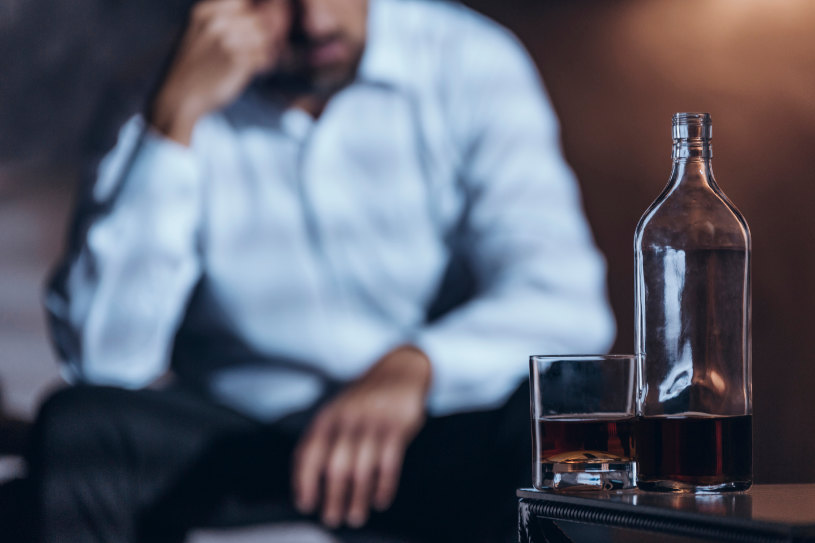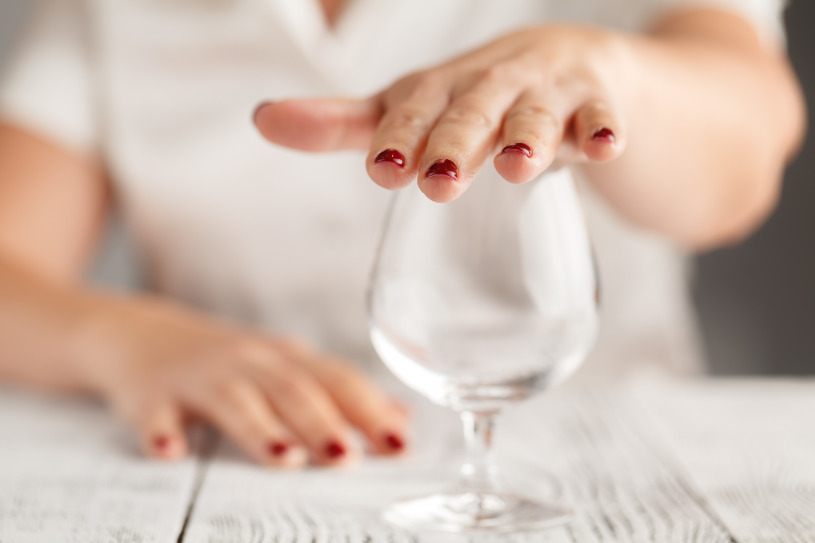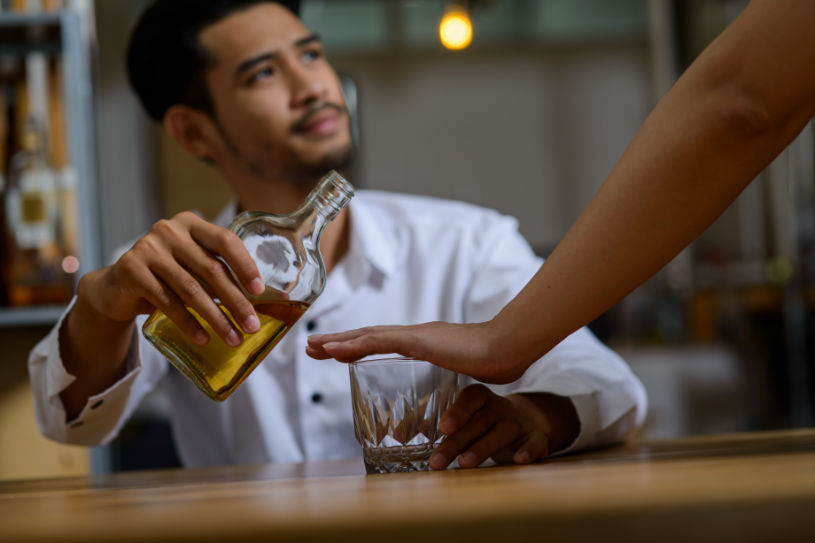Ideally, any practical approach for how to quit drinking – especially if the addiction is long-term, should involve getting professional treatment. This can then be followed by joining support groups.
However, not everyone will be able to afford to get the best treatment at expensive rehab centers. Not everyone will warm up to the idea of sharing the problem at support groups or similar help programs.
Table Of Contents:
On that note, this article reviews some of the most effective treatment options available to people looking for how to quit drinking – including, but not limited to, the previously mentioned options of rehabs and support groups. The text covers other approaches such as counseling, interventions, and home treatment approaches.
It is important to stress that one still needs to go through any of these recommended processes under proper medical supervision and preferably with a loved one – friend or family.
Admitting the Problem: The First Step in Recovery
The hardest part of getting sober is not the actual quitting or even the withdrawal symptoms during rehab; it’s admitting there is a problem and attempting to do something about it. For many people who are struggling with alcohol abuse, denial is a substantial part of the addiction.
Some of the Signs that There Is a Serious Problem With the Alcohol Abuse Include:
- Continually thinking about alcohol and wondering if there is a problem
- Сomparing one’s drinking patterns to others
- Taking online tests to find out whether there is a dependency
The one crucial question everyone must ask themselves is: Can I imagine life without alcohol? If the answer is no, it signals a problem.
Alcohol use disorder doesn’t only affect the drinker; it can wreck the lives of the people around the abuser. As friends and family members become increasingly concerned about their beloved one’s abuse problem, they might gently approach them and try to address the condition.
In the best-case scenario, this action will be well-received, and the affected individual will act upon it. However, if the patient is in denial about their addiction or simply doesn’t react to the initial talks, an intervention is most likely due.

What Does an Intervention Entail?
An alcohol intervention is a structured, face-to-face meeting between the person who is misusing the substance and their loved ones. The meeting can be supervised by a professional substance abuse interventionist such as a counselor or therapist who is no stranger to situations of this type.
Interventions are Staged to Achieve the Following Objectives:
- To educate the person on the destructive behaviors, the addiction can incite
- To make the person aware of the negative effects their alcohol abuse places on the domestic budget
- To make the person realize how the addiction is putting a strain on their romantic relationships
- To make the person realize how the substance chips away at his or her ability to be productive and creative at work
- To encourage the addict to identify the root problem of their drinking behavior
- To nip the addict’s denial in the bud
- To present a detailed and realistic treatment plan
- To illustrate to the affected person how the treatment will work towards an improved, healthier life
- To assure the abuser support is available throughout their journey
A professionally-conducted intervention session will have a much higher success rate than an amateur-led one.
Such sessions are chaired by a qualified alcohol intervention specialist, a mental health specialist, or a licensed alcohol and drug counselor. According to the National Council on Alcoholism and Drug Dependence (NCADD), a professionally-led intervention brings successful results in 90 percent of all cases.
A professionally-conducted intervention session will have a much higher success rate than an amateur-led one.
How To Stage An Intervention At Home?
There isn’t one right home-held intervention model. The best method will depend on the circumstances surrounding the individual’s case. The amount of preparation put in the session itself will play a key role, too.
Furthermore, it is important to determine the extent of one’s drinking problem and the potential repercussions. Finding out for how long the addiction has been going on will be the first step of assessing the situation and choosing between the intervention programs.
Only once the addiction context has been discussed in preparation for the intervention can one act to resolve it. One of the first steps is to ask all participants to write a personal letter.
Before staging an intervention, it is crucial to rehearse the scripts among participants. This will ensure no one gets carried away by the emotional intensity of the situation and will provide the attendees with a chance to listen to each other and figure out what sounds right.
The last thing an individual wants to do is come across as threatening or aggressive, and such gestures can be picked upon swiftly during the rehearsals. As soon as the participants go through each other’s scripts, a meeting time and place should be decided upon.
Keep the Following in Mind When Choosing a Time and Place for the Meeting:
- Limit the meeting to 60-90 minutes.
- Choose a time when the loved one is sober and able to think clearly.
- Ensure that nobody has to leave the meeting midway to attend to other matters.
- It is a good idea to hold the intervention meeting right after the loved one was involved in an alcohol-induced accident or violence.
- Choose a place where everyone can feel comfortable.
- If a person decides to hold the meeting in a public place, ensure that a person finds a spot that offers maximum privacy.

How to Maximize the Possibility of Success?
Try to increase the chances of success with these after-steps:
- Follow up on the loved one’s promises to seek help.
- Strictly enforce consequences, if need be. If the loved one does not seek help, enforce the consequences one had spelled out during the meeting.
- Prepare for another intervention. A meeting may not immediately end in the wished-for results, but it will spotlight the problem. It may get the abuser thinking about his or her drinking behavior. In such cases, striking while the iron is hot is essential, and preparing to organize another intervention meeting is necessary.
An alcohol intervention meeting’s success is not gauged by whether or not the addicted person learns how to stop drinking alcohol right away. An intervention’s primary goal is to help the abuser realize they are addicted and seek help.
After the intervention, the recommended treatment option is inpatient care, in which treatment is provided in a residential setting. These in-house treatment centers typically require patients to live at the facility for a fixed period, typically between 30 and 90 days.
This time spent in a distraction- and temptation-free environment enables doctors, therapists, and the patients themselves to focus completely on rehabilitation and thus increase their chances of success.
What is Inpatient Alcohol Rehabilitation?
Residential rehab involves “checking in” to a residential facility, either a discrete and isolated wing of a larger hospital or health complex or a standalone facility.
An individual essentially puts their life on hold for the period they are in rehab and commits to staying for an agreed-upon time. Inpatient treatment – and thus taking time out from their daily life – can be beneficial for those who want to become sober, especially those who have tried other approaches that didn’t work for them.
The actual length of time spent at an inpatient facility will vary depending on individual circumstances. Still, the first part of the stay will involve a period of medically supervised detoxification.
The detoxification process is followed by other forms of therapy and activities designed to help resident patients examine beliefs or negative self-concepts that may damage them and perpetuate their addiction. These therapies seek to eliminate destructive patterns of behavior and replace them with new, healthier patterns.
There isn’t one right home-held intervention model. The best method will depend on the circumstances surrounding the individual’s case.
What Types of Alcohol Inpatient Treatment Exist?
There are two basic types of inpatient rehab centers:
- Government– or state-funded facilities tend to be focused on providing help to people with low incomes and/or no health insurance to help pay for rehabilitation. Services at these facilities are either free or based on income. They do not necessarily represent a low level of care because they are closely monitored to ensure that their staff is composed of qualified professionals and provides mandated levels of rehabilitation care.
- Private facilities often provide a higher quality of treatment for alcoholism and are more often covered by private health insurance. They have staff that is available around the clock to attend to the needs. Naturally, these types of rehab facilities cost more. Still, if an individual has private health insurance that was purchased through the Healthcare Marketplace (Obamacare), chances are it will completely cover the treatment of addiction.
- In some states, a third option is possible, non-profit treatment. These inpatient rehab centers charge either no fees or lower fees than private centers, but they may have long waiting lists, and one may have to undergo some kind of assessment to make sure a person qualifies for their programs. These non-profit centers are not nearly as easily accessible or available as state or private establishments.
The first two types of centers offer full-time inpatient rehab services, outpatient services, and partial hospitalization. Partial hospitalization services include a range of intensive and structured activities for people with alcoholism, including behavioral treatment and medication management, for at least 20 hours per week based on an individualized treatment plan.

What Happens in an Alcohol Inpatient Rehab Center?
Although individual treatment regimens vary from center to center, an individual can expect the following when they check-in for a period of inpatient treatment:
First Week
- Initial examination. Because a patient’s health is the facility’s #1 priority, they will receive a full physical and psychological assessment. This will help the doctors and counselors design a treatment program tailored to the person’s needs, which gives them the highest likelihood of success.
- Detox. This is typically the most difficult part of recovery because the body has to deal with the physiological effects of stopping alcohol use. These effects can sometimes be unpleasant, so if necessary, they are managed with medications administered by physicians experienced in recovery.
Daily Life
- Sleeping arrangements depend on the facility and its specific approach. Some inpatient rehab centers require patients to have roommates to avoid isolation; others offer private rooms.
- Eating arrangements may similarly vary. Some facilities have sit-down group meals, and in others, patients have kitchens where they can prepare their foods. Be sure to let the staff know about any special nutritional needs one may have.
- Relationships – In most in-house alcohol treatment centers, relationships between patients are not encouraged and may be forbidden. This is to ensure that the primary focus remains on recovery.
- Access to phones and email may be restricted in some facilities. In others, especially those providing treatment options longer than 30 days, individual computers and phones may be allowed.
Contact with friends and family. Some facilities may advise not staying in constant contact with friends and relatives during inpatient treatment, significantly if they may trigger relapses. However, other facilities allow and encourage family members to play an active role in the recovery process.
Types of Therapy
Depending on the facility and the treatment plan, individual counseling and therapies will be provided, which can include:
- One-one-one individual therapy/counseling
- Group therapy
- Family therapy
- Cognitive-behavioral therapy to eliminate destructive patterns
- Introduction to follow-up care, in which an individual is introduced to programs one can continue with after the in-house treatment is complete.
These programs increase the chances of successful rehabilitation when the patients leave the inpatient treatment center and transition back to “life in the real world.”
An alternative to inpatient treatment is outpatient treatment. This is usually recommended in cases that are not as severe or cases where the patient has strong responsibilities that cannot be halted for inpatient care.
An alternative to inpatient treatment is outpatient treatment. This is usually recommended in cases that are not as severe or cases where the patient has strong responsibilities that cannot be halted for inpatient care.
What is Outpatient Treatment for Alcoholism?
Non-residential outpatient programs to treat alcoholism are offered in community health clinics, doctors’ or psychologists’ offices, or in some residential addiction centers that are equipped to support outpatient care.
Outpatient treatment is appropriate for those whose addiction is not severe, whose lives are fairly stable, and willing to participate in and commit to the treatment plan.
Outpatient treatment is also often recommended as a form of “continuing care” for those who have completed an inpatient treatment program to help maintain the long-term effects of recovery and prevent relapse.
Outpatient alcohol treatment tends to cost much less than inpatient care.

What Types of Alcohol Outpatient Programs Are There?
Outpatient rehab can include one-on-one or group counseling sessions, the supervised use of medications to handle initial detoxification issues, and many forms of behavioral therapy. Behavioral therapy can be a highly effective treatment method in outpatient settings because it encourages patients to control their addiction.
Some Common Forms of This Type of Therapy Include:
- Individual or group counseling.
- Family counseling
- Cognitive-behavioral therapy (CBT)
- Contingency management therapy
- Motivational enhancement therapy (MET)
Alcohol Counselling: How Does It Help?
Counselors for this addiction are professionals who are trained to help individuals from diverse backgrounds accomplish their goals. Counseling can help a person with addiction change their thinking and behavior. Alcohol abuse counseling is a collaborative process with a specific objective.
An alcohol counselor is a non-judgmental and supportive professional who helps addicts develop strategies to remain sober. These counselors offer advice and provide solutions to help a person recovering from alcoholism overcome the challenges of giving up alcohol.
Professional counseling is beneficial for people who have attempted and failed to give up alcohol independently. Confidentiality is an essential part of addiction treatment.
Counseling for Alcohol Abuse: How Long Does It Take to Get Sober?
Some outpatient and inpatient treatment programs are available to people trying to beat an addiction to alcoholic drinks. The most well-known options, such as the 12-step program or the 28-day inpatient rehab, do not necessarily work for everyone.
Counseling should ideally continue until the problem is resolved or at least until it becomes manageable. The duration of counseling may also be dictated by the number of sessions that an individual’s insurance company will pay for.
Counseling can help a person with addiction change their thinking and behavior. An alcohol counselor is a non-judgmental and supportive professional who helps addicts develop strategies to remain sober.
Types of Therapy: What is the Best Alcoholic Counseling?
No one therapy can be said to be better than the other. For some recovering alcoholics, individual therapy is necessary to develop the skills to reduce drinking and set achievable goals.
Other people battling an addiction benefit from the challenges and support offered by group therapy. Peer support groups, which are not led by trained professionals, may benefit some individuals as part of the recovery process.
People trying to overcome addiction to alcoholic beverages while also suffering from significant mental health issues are more likely to require personalized counseling for alcohol abuse.
Some of the Options for Alcoholism Counseling and Treatment in This Regard Include:
- Seeking help from the primary care physician to determine whether an individual has a drinking problem, evaluate their overall health, and provide advice on the type of care necessary.
- Undergoing behavioral therapy with a professional counselor for alcohol addiction to change drinking patterns and habits that trigger alcohol consumption.
- Being prescribed medications to reduce or stop drinking and prevent relapse.
- Attending mutual-support groups such as Alcoholics Anonymous (AA) to learn how to quit drinking or just to cut back.
- Going to group therapy sessions with a qualified counselor for alcohol addiction.
- Receiving one-on-one help from a counselor.
In line with the previously listed types of therapies recommended for alcoholics looking for how to quit drinking and remain sober, brief detail about each listed therapy approach follows:
Individual or Group Counseling
Individual sessions may focus on learning how to stop drinking alcohol and more effectively manage aspects of life such as work and family relations. Group counseling sessions can also be effective due to the reinforcement gained from peer discussion and support.
Cognitive Behavioral Therapy
This therapy is offered as a one-on-one session or in a group. It focuses on the situations and feelings that lead a person to drink. The triggers for heavy drinking are identified during this type of counseling, and ways to manage stress and avoid relapse are taught.
This therapy aims to teach the recovering alcoholic to lead day-to-day life and avoid the cues that trigger problematic drinking patterns.
Family and Marital Counseling
In this type of therapy, counselors involve the recovering alcoholic’s family in the healing process. The goal is to improve and repair the relationships damaged by an individual’s dependence on alcoholic beverages.
Seeking help from a counselor for alcohol addiction through family sessions has proven efficacy. Research has shown that people with strong family support are more likely to remain sober than people trying to kick the habit on their own.
Contingency Management Therapy
This technique encourages alcohol-free behavior by providing positive reinforcement in the form of rewards and privileges. It is often a voucher-based system in which patients “gain points” for participating in counseling sessions or other therapies.
Motivational Enhancement Therapy
This is a short-duration therapy that helps a recovering alcoholic build strong motivation to change drinking patterns. The focus is on understanding the benefits of seeking help, formulating a plan to change behavior, building motivation, and developing skills to remain sober.
Brief Interventions
These are limited-time sessions, either personalized or in a group. Counselors provide information about the risks of drinking, obtain feedback, develop specific goals, and suggest solutions to remain abstinent.
Apart from these therapy approaches, support groups are another great way to continue recovery after rehab. The post-recovery phase is just as important as the actual treatment stage as it controls the likelihood of relapse, and support groups are a great way to prevent this from happening. So, why are these programs so effective?

Why are Alcohol Support Groups so Effective?
Alcohol addiction support groups are very close-knitted, comprising only a few members joined by a sense of intimacy and a communal effort to overcome the addiction. The group-held meetings allow members to interact with one another, share their stories of success and failure, all while offering comfort, support, and motivation to each other.
Alcohol Meeting Groups will Usually Share Key Rules Such as:
- Every group requires a sponsor, a person who has been sober for a long time
- The sponsor is there to lead the group meetings and set a positive example
- Participation in support group meetings returns optimal results if the person also undergoes other addiction treatment methods
- Visiting a professional treatment program is not mandatory to gain admission into a group
- Most of the support group meetings are free of charges
Alcohol support sessions can be of two types: 12-step and non-12-step groups. The classification is based solely on the treatment philosophy endorsed by a group.
What are the 12-step Alcohol Abuse Support Groups?
The primary 12-step program is the Alcoholics Anonymous (AA) support group. As one might have guessed, members of the fellowship follow a 12-step program towards a full recovery from alcohol abuse. During the sessions, individuals are usually encouraged to invoke a Higher Power (God) and surrender to it with the belief of a guided journey to sobriety.
The 12-Step Philosophy Aims to Achieve the Following:
- Remove the shame factor from an addiction. By accepting that alcoholism is a disorder one can’t control, the 12-step program strives to shame alcohol addiction. When the person does not feel guilty and ashamed, they are more proactive in seeking and continuing treatment.
- Instill belief in the” help from above.” A belief in a higher power source helps boost confidence in the treatment process and speeds up the recovery process.
- Facilitate support by guidance and example. The 12-step recovery groups organize face-to-face meetings regularly to encourage members to share their life stories. Abusers can learn from each other’s anecdotes of struggles, challenges, failures, and triumphs straight from the trenches.
- Promote the idea of human imperfection. The members are encouraged to understand that it is possible to recover even if they gave in to the urge to drink.
According to the AA General Service Office, there are more than 64,000 support groups and more than 2 million members in the US and Canada. There is at least one AA support group in every community of the US, making it easy to find a plethora of nearby alcohol abuse support groups online. There are more than 114,000 alcohol addiction support groups all around the world.
AA is undoubtedly among the most popular 12-step alcoholism support groups globally, and its participation has been associated with higher chances of sustained sobriety.
The key to making the program work for a person is active involvement and engagement. The best results are usually guaranteed if the person:
- Attends meetings consistently and frequently. This will likely amount to around three sessions per week.
- Takes part in all or most of the group activities prescribed by the AA sponsor.
- Completes each step with sincerity and keeps in touch with the sponsor.
The 12-step philosophy aims for a holistic therapeutic intervention. Abstaining is the primary goal of this treatment philosophy. The overarching goal is to bring about a profound shift in attitude and alter behavioral responses. This way, a person can sustain sobriety while rebuilding their own life and mending their relationships.
Recognize and admit the problem, avoid situations that trigger the habit, get the right form of treatment with rehab and therapy, consider post-rehab options with support groups and let the body itself be in the right place to handle all these changes
The Alternatives to the 12-Step Programs
For those who prefer nonreligious support groups, there are alcohol support groups other than AA. Non-12-step groups take a secular approach to treatment and recovery.
These anti-alcohol groups include the Self-Management and Recovery Training (SMART Recovery) and Secular Organizations for Sobriety (SOS). There is no emphasis on Higher Power. Instead, individuals bring about attitudinal shifts and behavioral changes within themselves through education and encouragement.
The Following are the Characteristics of a Non-12-Step Alcohol Support Group:
- These groups are ideal for individuals who are uncomfortable with the idea of their powerlessness or trusting their chances of recovery to a more significant entity.
- Individuals of any belief can become members of the nonreligious support groups
- Individuals who are not comfortable sharing their life stories with others feel at ease attending non-12-step support group meetings because the treatment methodology relies more on one-to-one counseling sessions and less on group therapies.
There are several non-12-step alcohol groups other than AA to choose from:
Secular Organizations for Sobriety (SOS)
The SOS is a popular non-spiritual alternative to AA. SOS is made up of autonomous bodies spread across various cities and states of the US. These local chapters organize regular meetings.
It places the onus of acquiring and maintaining sobriety squarely on the individual. Hence, the person has the satisfaction and peace of mind knowing that he or she is really “doing” something to overcome addiction.
Self-Management and Recovery Training (SMART Recovery)
SMART recovery supports long-term abstinence and sustained sobriety using a scientific treatment methodology. They prescribe drugs and advise members to undergo psychological assessment and therapy using the latest scientific findings.
There is also an emphasis on teaching members practical skills to boost self-confidence and facilitate rehabilitation.
The Goals of SMART Recovery are Self-Empowerment and Self-Reliance and Include:
- Remaining motivated and committed to sobriety
- Coping with urges healthily
- Managing behavioral responses
For best results from these programs and groups for how to quit drinking, one must also be ready to take on a lot of responsibility to avoid situations where the habit can be triggered again. For this, there are a few tips for cutting down drinking that can be very effective if followed to the letter.

10 Ways To Cut Down Drinking
There is no one best way to stop drinking alcohol. Different strategies work for different people. However, certain constants should be adhered to in the path to recovery. The first is to commit to the purpose of the decision to stop drinking alcohol.
Once a person understands that alcohol is not needed to survive, they need to commit to quit for good.
Here are Ten Tips on How to Quit Drinking that are Easy to Implement:
- Socialize Without Alcohol. Alcohol is an integral part of many social activities. This makes it easy to overdo and challenging to cut down. However, socializing sober is not impossible. For example, instead of Friday night drinks with colleagues, sign up for a team sport. Attend a group exercise class. Go to the movies. This will make it easier to quit alcohol and improve overall health, develop genuine connections, and find new hobbies. Best of all, there’s no hangover the next morning.
- Don’t Stock Alcohol at Home. One of the best ways to stop drinking is to stop keeping any alcohol in the home. A 6-pack in the fridge makes it too easy to reach for one at the end of a long day.
- Avoid/Restrict Visiting Places With Alcohol. Going to places where alcohol is readily available can be a trigger leading one to drink again. Places such as bars should be avoided while you’re trying to figure out how to quit drinking.
- Learn to Deal with Stress. For many people, alcohol is a temporary escape from reality and the stressors of daily life. The best way to stop drinking emotionally is to learn healthy relaxation techniques. Turn to yoga, meditation, or psychotherapy to cope with sadness, stress, and negative emotions without putting oneself at risk of becoming an alcoholic.
- Ditch The Drinkers. Peer pressure can make figuring out how to quit drinking very challenging. Learn to say no firmly but politely. Stick to a predetermined limit. Don’t drink just because others are. On that note, staying away from friends who drink or encourage drinking can be a good solution to this.
- State the Intent to Quit Drinking Alcohol. Stating the intent to quit to family and friends is a good idea. Ask for support and encourage them to give reminders about this resolution.
- Keep a Diary. One of the most critical steps on how to quit drinking is to keep track of the alcohol consumed. Set a goal based on the recommended guidelines of 1-2 standard drinks per day for adult women and men. Try to stay within these limits.
- Take a Break. Heard of Sober October or No Drinks November? Decide not to drink for a month. Try to cope emotionally and physically without alcohol. If a whole month without booze feels overwhelming, start with 1 or 2 days a week. This small step will go a long way in helping with cutting out alcohol in the long run.
- Handle Urges. Many people drink out of habit. Alcohol is addictive and can cause some pretty strong urges. Be aware of the times of day when the tendency to drink is high and keep busy. Get involved in a healthy activity that distracts from mindless alcohol consumption.
- Don’t Give Up. It can take more than one attempt to stop drinking. Don’t be discouraged if efforts don’t yield immediate results. Be persistent, take setbacks in stride, and keep the long-term goal in mind.
For a person trying to overcome alcoholism, learning to enjoy life without the chemical buzz can be a challenge, so it is vital to fill in time with other healthy habits.
Quitting Alcohol Safely
It is not unusual to feel anxious, restless, excited, or shaky when trying to quit alcohol. For long-term alcoholics, it is particularly more challenging. This is why it is extremely crucial to follow all the recommendations discussed in the text.
Recognize and admit the problem, avoid situations that trigger the habit, get the right form of treatment with rehab and therapy, consider post-rehab options with support groups and let the body itself be in the right place to handle all these changes. For this, it is important to focus on a balanced healthy diet and stay well hydrated.
It is a lot of work, but the results are well worth it.
Hope Without Commitment
Find the best treatment options. Call our free and confidential helpline
Most private insurances accepted
Page Sources
- National Institute on Alcohol Abuse and Alcoholism. Drinking Levels Defined. https://www.niaaa.nih.gov/alcohol-health/overview-alcohol-consumption/moderate-binge-drinking
- Substance Abuse and Mental Health Services Administration. Find Help: Alcohol, Tobacco, and Other Drugs. 2020. https://www.samhsa.gov/find-help/atod
- New Hampshire Department of Health and Human Services. Treatment Services. https://www.dhhs.nh.gov/dcbcs/bdas/treatment.htm
- Dennis M. Donovan, Michelle H. Ingalsbe, James Benbow, and Dennis C. Daley. 12-Step Interventions and Mutual Support Programs for Substance Use Disorders: An Overview. 2013. https://www.ncbi.nlm.nih.gov/pmc/articles/PMC3753023/
- Substance Abuse and Mental Health Services Administration (US); Office of the Surgeon General (US). EARLY INTERVENTION, TREATMENT, AND MANAGEMENT OF SUBSTANCE USE DISORDERS. 2016. https://www.ncbi.nlm.nih.gov/books/NBK424859/
- National Institute on Alcohol Abuse and Alcoholism. Self-help strategies for quitting drinking. https://www.rethinkingdrinking.niaaa.nih.gov/Thinking-about-a-change/Support-for-quitting/Self-Help-Strategies-For-Quitting.aspx
- Young-Chul Jung and Kee Namkoong. Pharmacotherapy for Alcohol Dependence: Anticraving Medications for Relapse Prevention. 2006. https://www.ncbi.nlm.nih.gov/pmc/articles/PMC2687624/
- National Institute on Drug Abuse. Principles of Drug Addiction Treatment: A Research-Based Guide (Third Edition) - Types of Treatment Programs. 2018. https://www.drugabuse.gov/publications/principles-drug-addiction-treatment-research-based-guide-third-edition/drug-addiction-treatment-in-united-states/types-treatment-programs
- Suneel M Agerwala, Elinore F McCance-Katz. Integrating screening, brief intervention, and referral to treatment (SBIRT) into clinical practice settings: a brief review. 2012. https://pubmed.ncbi.nlm.nih.gov/23210379/
- Amy O'Donnell, Peter Anderson, Dorothy Newbury-Birch, Bernd Schulte, Christiane Schmidt, Jens Reimer, Eileen Kaner. The impact of brief alcohol interventions in primary healthcare: a systematic review of reviews. 2013. https://pubmed.ncbi.nlm.nih.gov/24232177/


